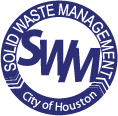We don’t pay them enough, it would seem.
For the last few months, Juan Sorto and his neighbors have looked toward the curb on Thursdays and asked themselves the same uneasy question: Did the garbage trucks come?
Last week, they had. The week before, they had not, according to Sorto. What is supposed to be a routine, weekly service has turned into a more haphazard enterprise in Sorto’s corner of northeast Houston, near Tidwell and Mesa. Sorto said his subdivision’s black bins often have been skipped entirely this year. His neighbors have started storing garbage in their recycling carts, with some spilling out into drainage ditches.
“There’s been times where we’ve gone more than a week without it getting picked up,” said Sorto, a former chair of the city’s Super Neighborhood Alliance. The Solid Waste Management Department said it checked its records and confirmed trucks had been through the neighborhood, but it would monitor the neighborhood more carefully in the future.
The reason for the uneven service, city officials say, is Solid Waste does not have enough drivers.
The department’s workforce has reached its lowest point in decades, and the department rarely is able to assign drivers to all of its routes. It often has to pull employees off recycling, yard waste and heavy trash routes to pick up garbage bins, which must be collected weekly, per state law.
The maneuvering leads to extensive and almost chronic backlogs in recycling and bulk collections, and it burns out drivers, who have been required to work six-day schedules since 2018. Drivers often tally 60 hours a week on Houston’s streets. The department is running nearly double its overtime budget for the year, and it has incurred overruns every year since 2014, often doubling or tripling the budgeted amount. It spent $6.3 million on overtime last year, $7.5 million the year before.
[…]
Solid Waste has struggled for years with collection delays, a scarcity of trucks and other fleet issues, mounting 311 complaints and frustration among residents and their elected leaders. Its workforce, though, is at its lowest point in years.
The department fell below 400 workers last September for the first time in at least two decades. As of December, the department had about 394 employees, down from 439 at the beginning of Turner’s first term, according to the city’s monthly financial reports. It had been treading water for years, with roughly the same number of workers in 2012. Meanwhile, the department has added more than 13,000 residential customers and picked up another 200,000 annual tons of waste in the last decade, budget documents show.
Facing a dwindling staff and a nationwide shortage of commercial drivers, the city last June announced $3,000 signing bonuses for up to 100 new drivers, who make an average base salary of $41,550. It did not stop the attrition; in fact, the department has lost more drivers than it has gained since then.
[Solid Waste Director Mark] Wilfalk called the dropping personnel numbers “scary.”
Private employers, he and the mayor said, simply are able to pay more than the city. Walmart recently announced commercial drivers can make up to $110,000 in their first year with the company.
Solid Waste’s personnel issues come down to basic math. The department has 181 routes that must be picked up each day. Yard waste collection routes require at least two people each, as do heavy trash routes. That means the department needs a minimum of 234 people a day.
Even though the department has 245 drivers and collection workers, some of those work at dump sites or spend their day delivering truck parts. Add in the 10 or so workers who are out sick or on vacation each day, and Solid Waste starts struggling to find enough drivers to cover its routes.
And because trash collection is the top priority, daily staff shortages usually mean recycling and bulk pickup routes get delayed.
See here for some background. That $41K starting salary is probably not going to cut it in this market, and is likely a threat of further departures given the crazy hours these guys are now having to work to keep up, though perhaps the overtime helps a bit. However you look at it, this is a problem that’s going to need some money to solve, and as such our old friend the trash pickup fee is being brought out again. Last seen in 2019 as a (dumb) proposal to pay for the firefighter pay parity measure that is currently blocked, the idea of charging something for solid waste pickup (as many Texas cities do) instead of paying for it all out of general revenue has been around since at least 2007 but has never gotten enough support in any form to be adopted. Will the current situation change that and allow for a fee to be implemented? Maybe, but betting on the status quo is usually the odds-on call. If it does come up again, this is the reason why.

